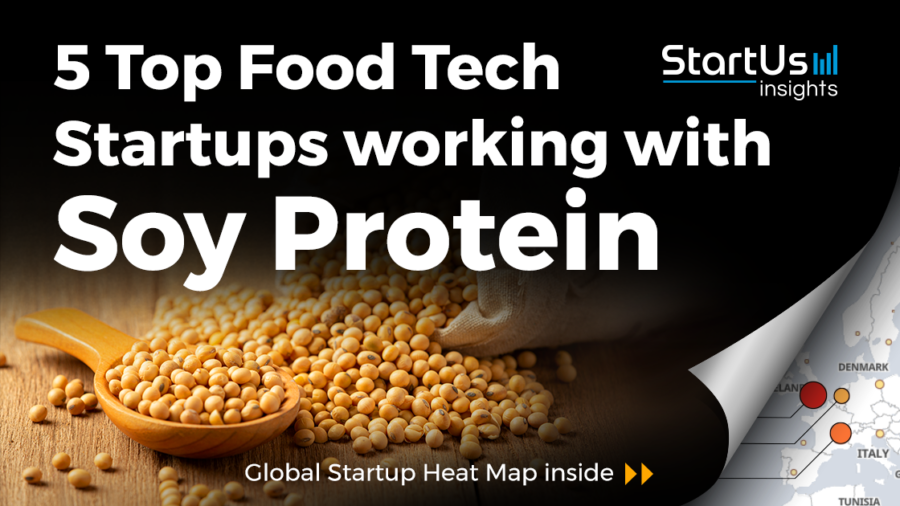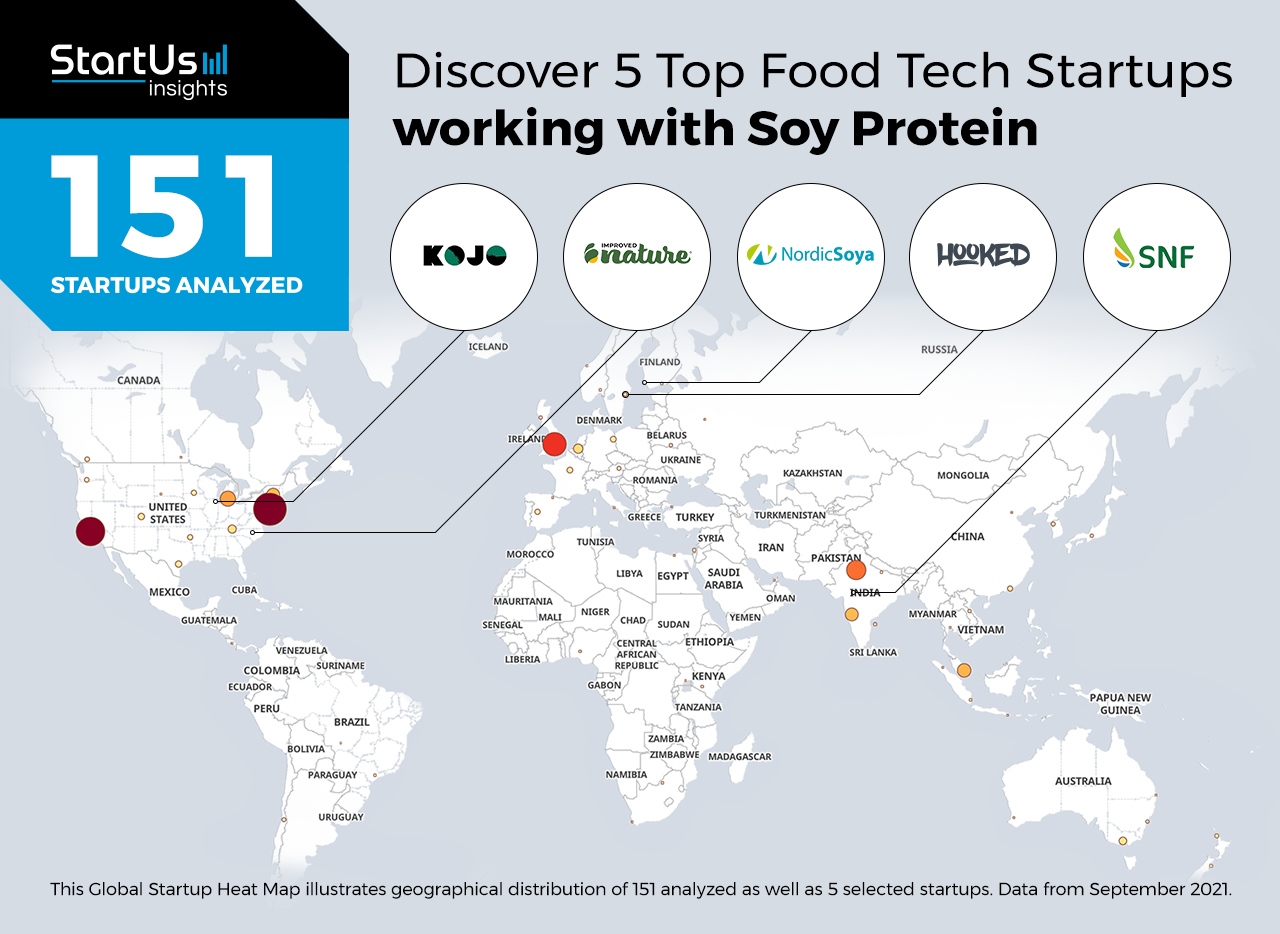Staying ahead of the technology curve means strengthening your competitive advantage. That is why we give you data-driven innovation insights into the food industry. This time, you get to discover 5 hand-picked food tech startups working with soy protein.
Out of 151, the Global Startup Heat Map highlights 5 Top Food Tech Startups working with Soy Protein
The insights of this data-driven analysis are derived from the Big Data & Artificial Intelligence-powered StartUs Insights Discovery Platform, covering 2 093 000+ startups & scaleups globally. The platform gives you an exhaustive overview of emerging technologies & relevant startups within a specific field in just a few clicks.
The Global Startup Heat Map below reveals the distribution of the 151 exemplary startups & scaleups we analyzed for this research. Further, it highlights 5 food tech startups that we hand-picked based on criteria such as founding year, location, funding raised, and more. You get to explore the solutions of these 5 startups & scaleups in this report. For insights on the other 146 startups working with soy protein, get in touch.
Improved Nature formulates Meat Alternatives
As consumers become more environmentally conscious and demand cruelty-free food products, plant-based alternatives for animal meat are one of the fastest-growing trends in the food industry. As a result, startups are using vegan sources of protein such as soy and pea as a substitute for animal-based meat. This gives food companies the opportunity to develop plant-based product lines for their consumers.
US-based startup Improved Nature makes meat alternatives. The startup’s proprietary process turns soy protein concentrate into plant-based food that mimics the texture of animal meat using heat, pressure, and steam. Its product range, Nature’s PRIME, includes fillets, poppers, nuggets, shreds, and chunks. Besides, these are sold in dry form with a four-year shelf life even without preservatives. The products are available to manufacturers supplying alternative protein options to food services, restaurants, and retailers.
Hooked Foods produces Seafood Alternatives
Despite the depleting population of fish in seas and oceans, the fishing industry is increasing its catch to meet consumer demands. Moreover, a significant percentage of fish caught worldwide is a result of bycatch. Those fish are thrown back into the sea, either dead or in critical condition. To protect the ocean ecosystem without having consumers give up eating fish, food tech startups are developing vegan fish and seafood alternatives made from soy, wheat, and pea.
Hooked Foods is a Swedish startup that offers seafood alternatives for restaurants and retailers. Its product Toonish is a soy protein-based vegan substitute for tuna. Another variant of the product, Toonish Tomat, is mixed with a tomato sauce and comes in three flavors — tomato, tomato & chili, and tomato & garlic. The startup estimates that every kilo of Toonish sold as a replacement for regular tuna saves 0.24 fish and 3.36 tons of carbon emissions.
Sun Nutrafoods offers Soy Flour
Most bakeries use wheat flour to make their dough. However, its nutrient quantity is lower than any other plant protein and therefore offers no additional value. As a result, startups are offering substitutes such as soy flour. The inclusion of soy protein in one’s diet has many health benefits including improved bone health, lower cholesterol levels, and reduced risk of heart ailments, among others. Moreover, soy is much cheaper than wheat and, hence, allows bakers to reduce their production costs while enhancing quality.
Indian startup Sun Nutrafoods provides a range of soy flours under the name SoyNutra. The startup processes soybeans into bakery products like full-fat soy flours, defatted soy flours, soy flakes, and soy grits. These items create a better crumb structure, improve dough machinability, as well as increase water absorption and retention. Additionally, due to their film-forming properties, the soy flours increase the shelf-life stability of baked products by preventing fat migration and water uptake.
Kojo makes Plant-based Jerky
The production of beef involves large amounts of water and resources, which makes it highly unsustainable. Besides, cows are injected with hormones and antibiotics for increased body weight. These eventually enter the food chain and adversely affect consumers. To address this, startups are offering alternative proteins including soy-based food products. These use much less water and have lower carbon emissions while also offering various health benefits.
Kojo is a US-based startup that offers plant-based jerky made from defatted soy flour. It comes in three flavors — cracked pepper, ginger teriyaki, and spicy chipotle. Being rich in amino acids, soy significantly replicates the protein content of beef. Moreover, the products are a good source of dietary fiber, something that is not found in traditional beef jerky.
Nordic Soya provides Fish & Animal Feed
Aquaculture feeds traditionally contain high levels of wild fish. However, this is not sustainable for marine ecosystems as it leads to overfishing, loss of habitat, and water pollution. To tackle these issues, startups are making use of plant-based protein sources such as soybeans to offer sustainable ingredients for fish and animal feed. Soy protein not only promotes growth in livestock but is a rich source of omega 3 fatty acids that contribute to fish growth.
Finnish startup Nordic Soya develops soy protein-based fish and animal feed. The process involves ethanol extraction, in which sugars, oligosaccharides, and anti-nutritional factors are removed from soybean meal, leading to the concentration of protein. Feed manufacturers use this soy protein concentrate to formulate their products. The concentrate is a rich protein source for young animals like piglets, calves, broiler chicks, and fish, as their digestive tract is sensitive to impurities and excessive sugars.
Discover more Food Tech Startups
Food startups such as the examples highlighted in this report focus on plant-based food, animal nutrition, and sustainable food products. While all of these technologies play a major role in advancing the food industry, they only represent the tip of the iceberg. To explore more food technologies, simply get in touch to let us look into your areas of interest. For a more general overview, you can download our free FoodTech Innovation Report to save your time and improve strategic decision-making.










